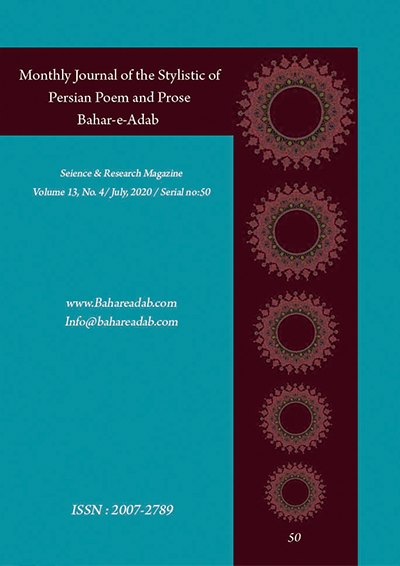- Count View : 645
- آدرس کوتاه شده مقاله: https://bahareadab.com/article_id/370
Journal of the stylistic of Persian poem and prose
volume Number 13،
number In Volume 4،
،
issue Number 50
Descriptiv-Contrastive Analysis of Ethical Versed Advices of Moulawi and Sa'di
Somayeh Soleymani, Abulqasem Qawam(Author in Charge)
Abstract
The professional recognition of a phenomenon depends on the measurement and comparison of the phenomenon with phenomena of the same type. Moulavi and Sa"di are seeking to guide and elevate their audience through their moral advices. But comparing their ethical recommendations reveals two substantial different ways of moral provocation. Both provocation ways are considerably welcomed in impressing the audience. Therefore, meanwhile revealing some of the artistic and effective methods of moral preaching, the research helps to better understanding of the personal styles of Moulavi and Sa"di through contrasting their works.
Based on the ethical recommendations extracted from the works of Moulavi and Sa"di, and reference to the evidence, the research argues that Sa"di, in his moral provocation, relies specifically on wisdom and reasoning, and in this regard he uses a special contrasting method, that essentially features his style. Moulavi, however, relie s heavily on religion and mystical principles for ethical advice. From another point of view, Sa"di focuses on preaching, making use of worldly motives for persuading the audience to acquire virtues, while Moulana is hidden behind the name of the beloved, and disrespectful to the world, calls the audience to good morality that leads to a better Hereafter.
Keyword
Etics
, Stilistics
, Moulawi
, Sa'di
- Holy Quran (2005), translated by Makarem Shirazi, Nasser, Mashhad, Quds Razavi Province
- Arbari, Arturjan (1992), Classical Persian Literature, translated by Assadollah Azad, Mashhad, Astan Quds Razavi
- Islami Nodooshan, Mohammad Ali (2011), The Four Speakers of Iranian Conscience, Tehran, Qatreh
- Aflaki, Shamsuddin Ahmad (1983), Managheb Al-Arefin, Tehran, Book World
- Amiri Khorasani, Ahmad (2004), Pride in Persian Poetry, Qom, Dar al-Huda
- Brown, Edward (1989), History of Iranian Literature, translated by Sadri Afshar, Gholam Hossein, Tehran, Morvarid
- Baha Valad (1973), Maaref, by Forouzanfar, Tehran, Tahoori
- Bahar, Mohammad Taghi (2002), Stylistics or the history of the evolution of Persian prose, Tehran, Zavar
- Tafazli Ahmad( 1378) History of Pre-Islamic Iranian Literature. Tehran: Sokhan
- Pournamdarian ,Taghi (1380 )in the shadow of the Tehran: sokhan
- Jafari Tabrizi, Mohammad Taghi (2000), Rumi and Worldviews, Tehran, Moasese Tadvin
- Khorramshahi, Bahauddin and Mokhtari, Siamak (2007), Quran and Masnavi, Tehran, Qatreh
- Razmjoo, Hossein (1990), Ancient Persian Poetry in the Scale of Critique of Islamic Ethics, Mashhad, Astan Quds Razavi
- Zarrinkoob, Abdolhossein (2001), Introduction to Literary Criticism, Tehran, Sokhan
- ………….. (1999), Step by Step to Meet God, Tehran, Elmi
- ……………. (2005), with Hilla caravan, Tehran, Elmi
- ………. (1374), Sir Ney, Critique and Analytical and Comparative Description of Masnavi, Tehran, Elmi
- Zamani, Karim (2007), Minagar Eshgh, Tehran, Ney
- Saadi, Mosleh Ibn Abdullah (2000), Bustan, edited by Gholam Hossein Yousefi, Tehran, Kharazmi
- Sultan Valad (1988) Maaref, corrected by Mayel Heravi, Najib, Tehran, Molly
- Forouzanfar, Badi-ol-Zaman (2006), Masnavi Hadiths and Stories, Tehran, Amirkabir
- Klini Razi, Mohammad (1998), Sufficient Principles, translated by Javad Mostafavi, Tehran, Golgasht
- Tusi, Khajeh Nasir al-Din (1985), Nasiri ethics, edited by Mojtaba Minavi, Tehran, Kharazmi
- Homayi, Jalaluddin (1981), Rumi Nameh, Tehran, Agah

